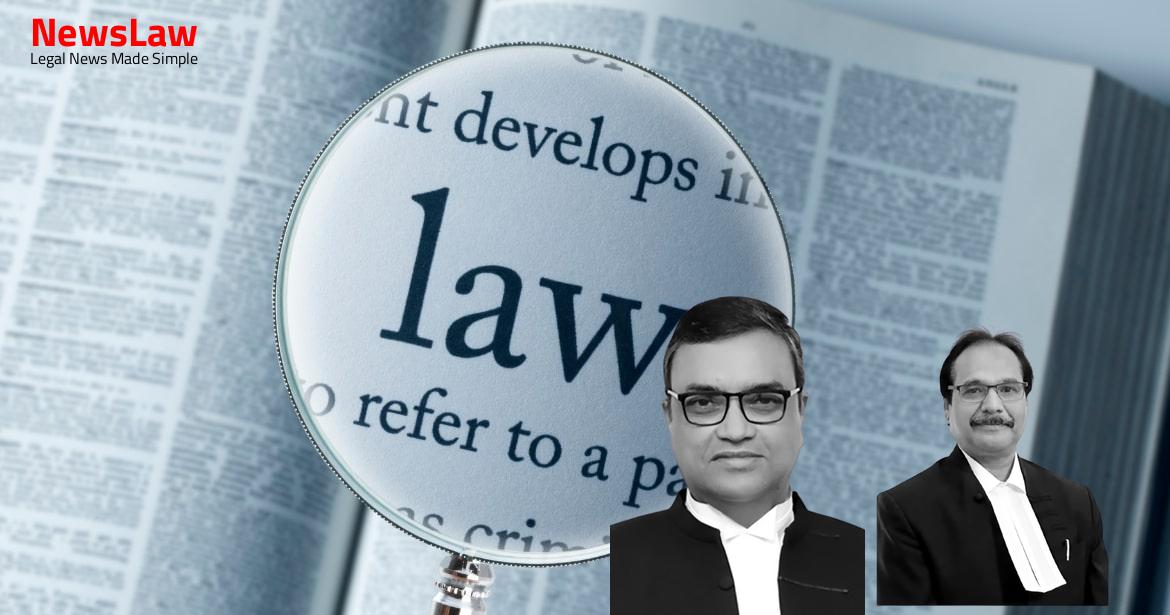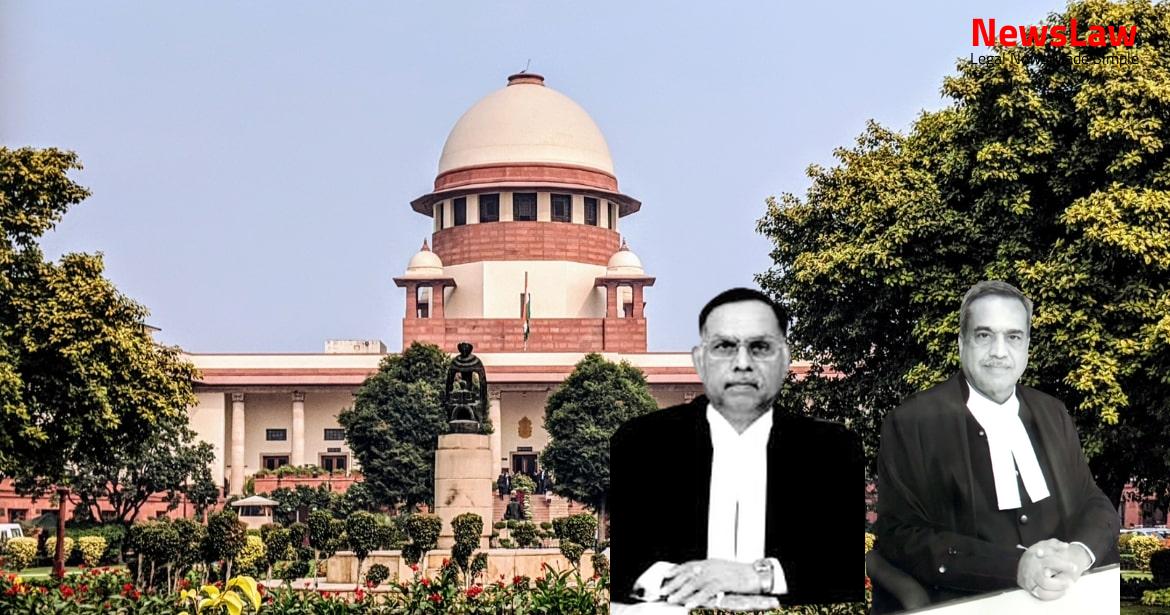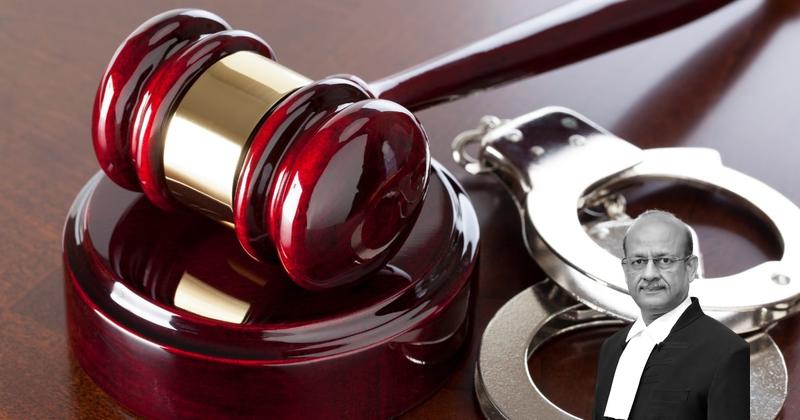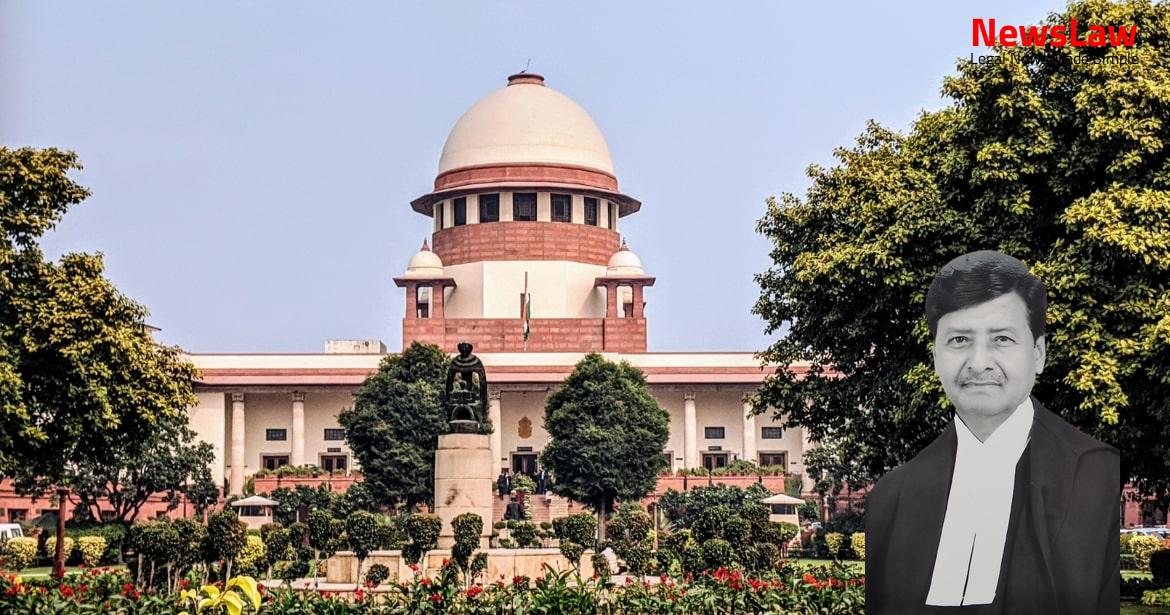In a recent landmark ruling by the Supreme Court of India, a judgment was passed regarding the disputed auction sale of a society’s property. The case involved issues raised by the appellant concerning irregularities in the auction process and alleged undervaluation of the property. The respondent No.6 emerged as the highest bidder and faced challenges from the appellant. Let’s delve into the details of this high-stakes legal battle over property rights.
Facts
- 1.1
- 1.2
- 1.3
- 1.4
- 1.5
- 1.6
- 1.7
- Valuation of the property and upset price were deemed fair by the High Court
- Three bidders not participating in the auction sale was not considered a valid challenge
- The High Court found no mala fide intentions in the auction sale
- The auction purchaser was a statutory body, not a private individual
Also Read: Seniority Dispute: Supreme Court Decision on Industrial Establishment Rules
Arguments
- Petitioner’s contention that auction process lacked adequate publication of the date and only two bidders participated.
- Petitioner’s argument that there were irregularities in the sale process despite High Court orders.
- Petitioner’s assertion that there were only two bidders in the auction sale despite contrary claims.
- Petitioner’s claim that interested buyers were excluded from the auction due to lack of proper procedure.
- Petitioner’s objection to the valuations of the property and the subsequent undervaluation at the auction sale.
- Petitioner’s dissatisfaction with the amount received from the auction sale compared to the outstanding dues.
- Petitioner’s allegation of mala fide actions in the auction process not being addressed by the High Court.
- Petitioner’s argument for a fresh auction of the society’s property to rectify the alleged irregularities.
- Respondent no.6 along with others participated in an open bid process and emerged successful with the highest bid.
- The respondent no.6 developed the purchased property in 2016 by expending a substantial amount of money.
- Three bidders had initially expressed interest and made deposits towards earnest money for the auction.
- The application for impleadment by the appellant is considered belated and should be dismissed in limine.
- Respondent no.6 is a bona fide purchaser of the property for value and should not suffer due to any upset in the auction sale at this stage.
- The selection of respondent no.6 as the highest bidder was not illegal.
- It was not the fault of government officers if a particular buyer does not turn up at the auction to compete.
- Two out of the three initial bidders turned up at the auction.
- The appeal presented by the appellant is without merit and should be dismissed.
- None of the government officers or the Chairman of respondent no.6 were parties to the writ petition of the appellant.
- The claim that respondent no.6 was unduly favored lacks substance.
Also Read: Landmark Judgment: Supreme Court’s Decision on Further Investigation Application
Analysis
- The State was required to submit a break-up of the amounts disbursed to creditors from the sale price as per the court’s order.
- The appellant filed an application detailing amounts paid towards taxes, dues, labor, liquidator’s remuneration, etc.
- The society was held liable to pay a sum to the appellant with interest, despite lack of possession or name in revenue records.
- The court noted the appellant’s long-settled matters should not be unsettled due to neglect.
- The respondent No.6 showed interest in purchasing the property despite the upset price, eventually acquiring it at a low price after a few years.
- The appellant failed to take immediate legal action against undervaluation of the property, resulting in lost time and opportunity to challenge the auction sale process.
- The writ court supports prompt litigants and does not encourage petitions from negligent individuals.
- The impugned judgment of the High Court is upheld
- Powers conferred by Article 142 of the Constitution of India are invoked for justice and fairness
- The interest of the appellant, a bank with outstanding dues running into crores of rupees, deserves consideration
- The sale effect in favor of the respondent no.6 by the Liquidator is not interfered with
Also Read: Supreme Court Ruling on Inclusion of Allowances in Deceased’s Income Calculation
Decision
- The Liquidator may disburse the amount to other creditors, excluding the appellant, as per priority.
- Pending applications, if any, shall stand disposed of.
- If all other creditors have been paid and none else remains to be paid, the balance amount of ₹29,78,499/- or any part of it may be disbursed in favor of the appellant.
- Within three months from the date, the appellant should receive the said sum of ₹29,78,499/- failing which it will accumulate simple interest @ 6% per annum till actual payment.
- Invoking power for complete justice, the respondent is directed to pay the appellant ₹1,05,98,710/- (without interest) as full and final settlement of the dues from the society.
- Parties are to bear their own costs throughout.
- The impleadment application stands disposed of as not pressed.
Case Title: THE AHMEDNAGAR DISTRICT CENTRAL COOPERATIVE BANK LTD Vs. THE STATE OF MAHARASHTRA (2024 INSC 741)
Case Number: C.A. No.-008343-008343 – 2024



